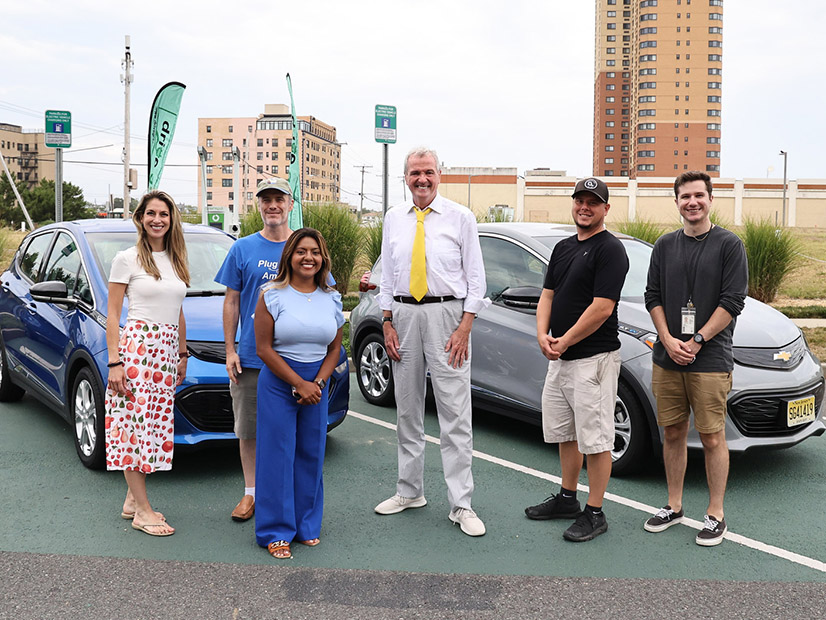
New Jersey on Monday launched the third phase of its Charge Up New Jersey electric vehicle (EV) subsidy program, cutting the maximum vehicle incentive to $4,000 but adding a new $250 subsidy for home chargers.
State officials said the incentive would apply to EV purchases beginning July 25 and would remain available until the $35 million in funding is exhausted. They also said they would begin accepting applications for three other programs that offer incentives to promote the use of EVs. Those programs pay for the installation of charging stations in tourist areas and multi-dwelling properties and help local and state governments add EVs to their fleets.
Speaking at a press conference in Asbury Park, Gov. Phil Murphy said the program, shows “our continued commitment to transitioning our economy away from fossil fuels.
“We know this incentive can push more buyers to making the decision to go electric,” said Murphy. The incentives will be especially effective, he said, “as the prices of EVs continue to fall more and more in line with gas-powered cars, especially in the all-important and growing mid-price category.”
The first two phases of Charge Up New Jersey, which is run by the Board of Public Utilities, assisted the purchase of about 13,000 vehicles.
Seeking ‘Incentive Essential’ Buyers
The new $250 incentive will be available for Level-Two chargers capable of capturing data, known as “smart” or “networked” chargers. The incentive will pay for chargers installed in a residence and will only cover equipment, not installation costs. The state budget approved in June allocated $5.5 million for the incentives.
At the same time, the BPU reduced by $1,000 the maximum EV incentive, from the $5,000 offered in the second phase. As before, the maximum incentive is only available for vehicles that cost $45,000 or less. Vehicles priced between $45,000 and $50,000 are eligible for an incentive of up to $2,000, and no subsidy will be awarded for higher priced vehicles.
The incentive is calculated by multiplying $25 by the number of miles that the vehicle will run on a single charge. For example, a 2021 Hyundai Kona Electric, which can run for about 258 miles on a single charge, according to the U.S. Environmental Protection Agency’s fueleconomy.gov site, would be eligible for the maximum $4,000 incentive.
The BPU implemented the $45,000 price-tag cap in the second phase after data showed that Tesla vehicles received 83% of the incentives in the first phase. The reduction meant that in the second phase only the lowest priced Tesla could get the maximum incentive. BPU officials said they believed that change would help the program focus on “incentive essential” customers: those who would only buy an EV if there was an incentive available. (See NJ Boosts EV Charging Program for Tourist, Multifamily Locations.) Indeed, data from the second phase show that Teslas accounted for 66% of the incentives granted.
Murphy noted that the available funds were quickly exhausted in the first two phases of the program.
“We expect more of the same this year,” Murphy said. “And with a refocusing of this incentive for mid-priced vehicles, we believe we can expand the appeal of an electric vehicle to more consumers.”
Expanding Charger Numbers
The EV incentive is part of a portfolio of programs aimed at helping the state meet the goals set out in the Energy Master Plan for the state to deploy 330,000 light-duty EVs on the road by 2025.
Slightly more than 64,000 EVs were registered to drive on New Jersey roads at the end of 2021, and there are about 750 chargers in the state.
The state in January 2020 enacted a law that called for the installation of at least 400 DC fast chargers, which can add about 60 to 80 miles to an EV in 20 minutes of charging, and 1,000 Level 2 chargers, which add 10 to 20 miles per hour of charging time, by Dec. 31, 2025.
New Jersey officials say the key to putting more EV vehicles on the road is to have more chargers available.
“We don’t want anybody to say ‘I’m not buying an electric vehicle because there’s not enough charging stations,” said BPU President Joseph L. Fiordaliso at the conference Monday.
To that end, New Jersey’s budget struck in June allocated $10 million to support the purchase of EVs by state and local governments, $6 million to put chargers at tourist sites and $4 million to put them in multi-unit dwellings.


